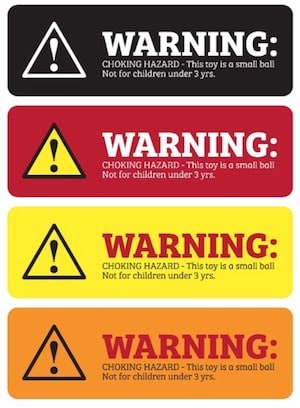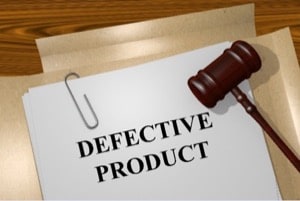Dangerous And Defective Product Claims In New York
Jed Dietrich, Esq. Will Fight to Obtain the Best Result for People Suffering Injuries or Illnesses Related to Dangerous and Defective Products.

There are too many accidents caused by defective products. Each day innocent people are seriously injured or even die from using products that were supposed to be safe. Product liability law was developed to hold manufacturers, distributors and sellers of dangerous and defective products legally responsible for the resulting damages and injuries. Designers, manufacturers and sellers of products are obligated to make sure that their products are not dangerous or defective in any manner to users. Companies are required to give proper warnings if their products are unsafe or if using the product in a particular manner way may be dangerous to the user’s wellbeing or safety.
Many injuries and fatalities that are caused by defective products could have easily been avoided if manufacturers designed safer products and properly warned users regarding any hazards. Unfortunately, in an effort to reduce costs and raise profits manufacturers often produce substandard or even dangerous products at the user’s expense. Just about any product can be a defective one. Product liability lawsuits commonly implicate agricultural products, car parts, food products, appliances, drugs and pharmaceuticals, machinery and children's toys.
However, it can be very challenging to prove a defective product caused your injury and go up against a big company on your own. That is why you want a highly experienced, aggressive, tenacious and hardworking Buffalo, New York personal injury lawyer like Jed Dietrich, Esq. on your side! Since 1999, Jed Dietrich, Esq. has exclusively handled serious personal injury cases and has battled to obtain over $250 Million in verdicts and settlements for people who are injured in Buffalo, New York and beyond. The Dietrich Law Firm P.C.’s team of top rated dangerous and defective product injury lawyers in Buffalo, New York possess the expertise and experience necessary to methodically investigate your defective product case, and ensure that you are in a position to receive the highest possible recovery for your injuries. Contact us today at 716-839-3939 for your free consultation. We can be reached 24 hours per day and 7 days per week, and there is never a fee unless we WIN for you!
In general, dangerous and defective products that could cause injuries are characterized as having any of the following defects:
- Design defect: Meaning that the design itself led the product to be unreasonably dangerous. Design defects occur before the product is ever manufactured.
- Manufacturing defect: Even when a product has been properly designed, some products might still be built or assembled defectively, causing them to be unsafe. Often these products fail to meet the designer’s specifications after production.
- Defect in warnings or instructions: Both manufacturers and distributors have a legal duty to warn potential product users of any hazards and provide sufficient labeling and instructions regarding proper use of products to avoid any unnecessary risks. Distributors may have marketed or promoted the product being used in an unsafe manner.
If you, or a loved one, were injured by a dangerous or defective product, contact the legal team of dangerous and defective product injury lawyers in Buffalo, New York at the Dietrich Law Firm P.C. today so that we can help you. We are dedicated and determined to get you the best possible result after your personal injury in Buffalo, New York and throughout New York State. Contact us today at 716-839-3939.

In order to triumph in a product liability claim, a plaintiff must establish that a party in the manufacturing or distribution chain is responsible for the injuries suffered from the defective product. Product liability claims pertain to one or more of the above defects and plaintiffs can assert claims of negligence, strict product liability or breach of implied or express warranty.
1) Negligence Claims
In order to demonstrate negligence of a product manufacturer or distributor, a plaintiff must prove:
- The manufacturer failed to exercise reasonable care in respect to the design, manufacturing, inspecting, testing or distributing of the product. It is important to note that the product has to be defective or reasonably dangerous when it is used in its intended or expected manner.
- The defect was present at the time the product left the manufacturer or seller’s possession.
- The plaintiff suffered an injury or fatality by using the product.
- The plaintiff’s injury or fatality was directly caused by the defect.
2) Strict Product Liability Claims
Strict liability for products holds manufacturers or anyone in the line of the product’s distribution liable for injuries resulting from defects in the product. It makes no difference whether or not the manufacturer or distributor was aware that the product was dangerous and the time they manufactured or sold it. Strict products liability holds the manufacturer responsible without fault, as long as there was a defect in the product.
Plaintiffs are still required to prove their injuries and that the product was a proximate cause of their injuries. Strict liability provides a high level of protection to consumers and encourages manufacturers to make their products safer.
3) Breach of Warranty Claims
Under New York law, a seller breaches an express or implied warranty when there is a reasonable expectation that someone will operate, use, consume or otherwise be affected by their product, and the user is actually injured by the product. It is not necessary for sellers to know the product was defective to demonstrate liability for the injuries, and lack of knowledge of a defect does not eliminate or reduce express or implied warranty in any manner.
When a product is sold, an implied warranty of merchantability, or fitness, of the product automatically denotes that the item is adequate for its intended purpose and does not have any defects. Implied warranties essentially represent that the manufacturer and distributors have ensured that the product they are providing is not unreasonably dangerous in relation to its purpose and utility. Some sellers provide express warranties, such as advertisements or product labels, with their products. The New York Court of Appeals held that manufacturers and distributors of a product may be held liable for breach of warranty in certain situations, even if a product was not defective and they were not negligent in making or selling the product.
If you, or a loved one, were injured by a defective product in Buffalo, Rochester, Niagara Falls or throughout New York State, you want the best Buffalo, New York personal injury lawyer to handle your claim. Jed Dietrich, Esq. and his team of Buffalo, New York dangerous and defective product injury attorneys are dedicated to safeguarding the legal rights of consumers that were injured because of a dangerous or defective product. Contact us today at 716-839-3939.
Attorneys for manufacturers and distributors of defective products often try to assert several defenses, which typically focus on the product user’s behavior when the accident occurred. These defenses commonly include:
1) Causation: This defense is contingent on a failure to warn or properly instruct users. In cases where there was adequate warning, it also relies on who the plaintiff asserts would have responded to the warning. This defense requires the plaintiff to show that they would have acted differently if an adequate warning was provided.
2) Foreseeability: Whether or not a particular use was actually intended for a product hinges upon if the use was reasonably foreseeable by the manufacturer or distributor. Defendants often assert that their product’s use was uncharacteristic or inappropriate. Therefore, it is important for the plaintiff to establish that they were using the product in the intended way.
3) Assumption of risk: Is a defense used to demonstrate that the product’s users knowingly and voluntarily assumed the risks associated with using the product. Assumption of risk can be expressed or implied. This defense has to be assessed based on the deliberate conduct by the product user.
4) Comparative negligence: Is a partial defense that can reduce the damages a product user can recover. It involves the level to which the user’s own negligence contributed to the product causing the injury.
5) Substantial change: In cases where a modification of the product, which was not reasonably foreseeable, is a superseding cause of the user’s injury, the defendant would not be held responsible even if there was a design defect.
WERE YOU, OR A LOVED ONE, INJURED AS A RESULT OF A DANGEROUS OR DEFECTIVE PRODUCT IN BUFFALO, NIAGARA FALLS, ROCHESTER, NIAGARA FALLS OR OTHER PARTS OF NEW YORK STATE?
CALL JED DIETRICH, ESQ. AND HIS TOP RATED AND HIGHLY EXPERIENCED TEAM OF BUFFALO, NEW YORK PRODUCT LIABILITY LAWYERS AT 716-839-3939 NOW TO OBTAIN THE HELP THAT YOU NEED!
Call the Dietrich Law Firm P.C. immediately at 716-839-3939 so that our aggressive, tenacious and hardworking personal injury lawyers can fight to obtain the best result for your personal injury claim in Buffalo, New York. We are available 24 hours a day, 7 days a week, and there is never a fee until we WIN for you!
 Dietrich Law Firm P.C. Home
Dietrich Law Firm P.C. Home










